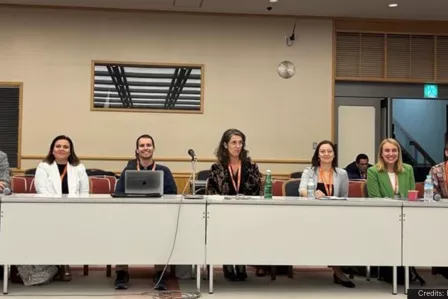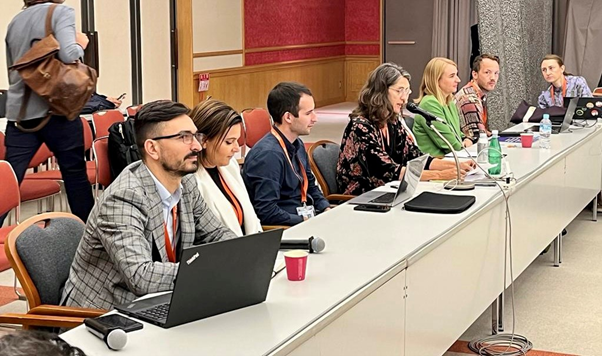This year’s Internet Governance Forum (IGF), the 18th annual edition, is hosted by the Government of Japan in Kyoto from 8-12 October 2023 under the Forum's overarching theme: The internet we want - empowering all people. The Insafe network of Safer Internet Centres in Europe contributed with a Day 0 event focusing on youth empowerment and participation, including children and young people from vulnerable backgrounds.

The session was organised by the Insafe Coordinator in collaboration with the Portuguese, Belgian, Maltese, Polish and UK Safer Internet Centres. The delegation shared their best practices on youth participation and how to engage young people in co-creating and developing new initiatives and resources. Moreover, the different centres explained how they collaborate with young people in developing awareness campaigns to effectively reach this target group, including those children in vulnerable situations, to tackle online trends.
In today's world, children are vulnerable for many reasons: poverty, disability, mental health issues, abuse or neglect, family breakdown, homelessness, discrimination, and social exclusion, not to mention migration and war. Several programmes have been designed to help social groups from diverse backgrounds, including those who are vulnerable. While these groups face different challenges, they also share the common need for online safety education and support in an increasingly complex social environment.
Moreover, all children can be considered vulnerable to an extent as they grow up in a world where decisions are made by others or adults, often with a very different perspective. Young people increasingly feel the pressure to adapt to a world where rights are not protected, risks are everywhere, and technological developments in the digital environment are beyond imagination.
The new European strategy for a Better Internet for Kids (BIK+), adopted by the European Commission in May 2022, aims to balance digital participation, empowerment, and protection of children in the digital environment. BIK+ is an adaptation of the 2012 BIK strategy, following a decade in which technological developments have exceeded all expectations.
Young people, as digital citizens of the future growing up in a digital environment, deserve to have a say in developments, safeguards, and their rights to shape the world they will live in. The BIK+ strategy, adopted after a long consultation process, aims to put children and young people at the forefront of key stakeholders and industry decisions in the digital environment in the coming years.

Each Safer Internet Centre participating on the panel presented their best practices related to youth participation.
Best practices from the Safer Internet Centre Belgium
Niels van Paemel, representing Child Focus Belgium, spoke about the CyberSquad initiative, a peer-to-peer online platform. As young people are increasingly online, it is easier to disclose their online issues through chat and with other young people their age because they feel better understood. This tool lets young people discuss their relationship issues, digital friendships, and online safety.
Best practices from the Safer Internet Centre Malta
Deborah Vassallo, from BeSmartOnline! Malta, talked about an initiative conducted annually with a group of young people. A session on online rights and digital citizenship is held in every school in Malta with 13- and 14-year-olds, encouraging them to participate in a three-day residential during the summer period, in which several activities related to online safety are held. During the residential, the young people have opportunities to produce positive online content resources, which the Maltese Safer Internet Centre subsequently uses to support awareness-raising initiatives.
Best practices from the Safer Internet Centre Poland
Anna Rywczynska, coordinator of NASK Poland, spoke about the Digital Youth Forum, held yearly in hybrid form to allow an online audience to participate from Poland and Ukraine. Young people organise the Digital Youth Forum for young people. It focuses on sharing online experiences and empowering young people to take the lead in online safety initiatives. Approximately 700 young people participate in person, and more than 100,000 young people participate online.
Best practices from the Safer Internet Centre UK
Boris Radanovic, from South West grid for Learning (SWGfL), part of the UK Safer Internet Centre, presented a peer-to-peer educational programme. Called Digital Leaders and targeting children and young people between the ages of 7 and 18, this program gives children agency to make a difference in online safety in their school community. Some of these children form part of the Youth Advisory Board, and they design initiatives and learning activities for their peers.
The workshop was moderated by the Portuguese Safer Internet Centre, with the participation of Sofia Rasgado and João Martins, representing the BIK Youth Ambassador Programme. A multicultural audience and many young people attended the workshop.
Forums such as the IGF provide an excellent opportunity for networking and sharing best practices among different stakeholders, putting the Insafe network and the Better Internet for Kids strategy on the global map and highlighting the need for young people's voices and ideas to be considered.
Additional references:
- Link to workshop session: IGF 2023 Day 0 Event #16 Youth participation: co-creating the Insafe network | Internet Governance Forum (intgovforum.org)
- Link to session recording: IGF 2023 - Day 0 - Workshop 6 - YouTube (from 2:07:40 – 3:18:54)
This year’s Internet Governance Forum (IGF), the 18th annual edition, is hosted by the Government of Japan in Kyoto from 8-12 October 2023 under the Forum's overarching theme: The internet we want - empowering all people. The Insafe network of Safer Internet Centres in Europe contributed with a Day 0 event focusing on youth empowerment and participation, including children and young people from vulnerable backgrounds.

The session was organised by the Insafe Coordinator in collaboration with the Portuguese, Belgian, Maltese, Polish and UK Safer Internet Centres. The delegation shared their best practices on youth participation and how to engage young people in co-creating and developing new initiatives and resources. Moreover, the different centres explained how they collaborate with young people in developing awareness campaigns to effectively reach this target group, including those children in vulnerable situations, to tackle online trends.
In today's world, children are vulnerable for many reasons: poverty, disability, mental health issues, abuse or neglect, family breakdown, homelessness, discrimination, and social exclusion, not to mention migration and war. Several programmes have been designed to help social groups from diverse backgrounds, including those who are vulnerable. While these groups face different challenges, they also share the common need for online safety education and support in an increasingly complex social environment.
Moreover, all children can be considered vulnerable to an extent as they grow up in a world where decisions are made by others or adults, often with a very different perspective. Young people increasingly feel the pressure to adapt to a world where rights are not protected, risks are everywhere, and technological developments in the digital environment are beyond imagination.
The new European strategy for a Better Internet for Kids (BIK+), adopted by the European Commission in May 2022, aims to balance digital participation, empowerment, and protection of children in the digital environment. BIK+ is an adaptation of the 2012 BIK strategy, following a decade in which technological developments have exceeded all expectations.
Young people, as digital citizens of the future growing up in a digital environment, deserve to have a say in developments, safeguards, and their rights to shape the world they will live in. The BIK+ strategy, adopted after a long consultation process, aims to put children and young people at the forefront of key stakeholders and industry decisions in the digital environment in the coming years.

Each Safer Internet Centre participating on the panel presented their best practices related to youth participation.
Best practices from the Safer Internet Centre Belgium
Niels van Paemel, representing Child Focus Belgium, spoke about the CyberSquad initiative, a peer-to-peer online platform. As young people are increasingly online, it is easier to disclose their online issues through chat and with other young people their age because they feel better understood. This tool lets young people discuss their relationship issues, digital friendships, and online safety.
Best practices from the Safer Internet Centre Malta
Deborah Vassallo, from BeSmartOnline! Malta, talked about an initiative conducted annually with a group of young people. A session on online rights and digital citizenship is held in every school in Malta with 13- and 14-year-olds, encouraging them to participate in a three-day residential during the summer period, in which several activities related to online safety are held. During the residential, the young people have opportunities to produce positive online content resources, which the Maltese Safer Internet Centre subsequently uses to support awareness-raising initiatives.
Best practices from the Safer Internet Centre Poland
Anna Rywczynska, coordinator of NASK Poland, spoke about the Digital Youth Forum, held yearly in hybrid form to allow an online audience to participate from Poland and Ukraine. Young people organise the Digital Youth Forum for young people. It focuses on sharing online experiences and empowering young people to take the lead in online safety initiatives. Approximately 700 young people participate in person, and more than 100,000 young people participate online.
Best practices from the Safer Internet Centre UK
Boris Radanovic, from South West grid for Learning (SWGfL), part of the UK Safer Internet Centre, presented a peer-to-peer educational programme. Called Digital Leaders and targeting children and young people between the ages of 7 and 18, this program gives children agency to make a difference in online safety in their school community. Some of these children form part of the Youth Advisory Board, and they design initiatives and learning activities for their peers.
The workshop was moderated by the Portuguese Safer Internet Centre, with the participation of Sofia Rasgado and João Martins, representing the BIK Youth Ambassador Programme. A multicultural audience and many young people attended the workshop.
Forums such as the IGF provide an excellent opportunity for networking and sharing best practices among different stakeholders, putting the Insafe network and the Better Internet for Kids strategy on the global map and highlighting the need for young people's voices and ideas to be considered.
Additional references:
- Link to workshop session: IGF 2023 Day 0 Event #16 Youth participation: co-creating the Insafe network | Internet Governance Forum (intgovforum.org)
- Link to session recording: IGF 2023 - Day 0 - Workshop 6 - YouTube (from 2:07:40 – 3:18:54)
- vulnerable users Internet Governance Forum (IGF) Insafe campaign
Related content
- < Previous article
- Next article >












